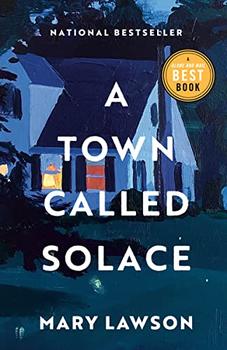Summary | Excerpt | Reviews | Beyond the Book | Readalikes | Genres & Themes | Author Bio

Clara herself had been in the mud room an hour or so earlier to give Moses his dinner. She allowed herself to leave her place by the window for a little while morning and night because she had promised Mrs. Orchard she would look after Moses while she was in the hospital. Rose would understand.
"He'll be happy with you here," Mrs. Orchard had said. "He trusts you, don't you, Moses?" She'd been showing Clara the mysteries of the new can opener. It was electric. You had to hold the can in the right place to begin with but it did everything else itself, it even turned the can around, slowly and smoothly, as it cut off the lid.
"A gadget," Mrs. Orchard had said. "Mostly I don't hold with gadgets but that old can opener isn't safe and I don't want you cutting yourself." Moses was winding himself around their legs, desperate for his dinner.
"You'd think we starved him," Mrs. Orchard said. "Now then, the can opener leaves the lid behind—do you see? It's magnetic. Be careful not to touch the edges of the lid when you pull it off the magnet. You have to pull quite hard and the edges are very sharp. Keep the can in the fridge until it's empty and then give it a rinse and put it in the garbage outside, not in here or it'll smell. Mrs. Joyce will deal with the garbage when she comes to clean. I've spoken to your mother and she's happy for you to come in and feed him twice a day for the duration. I won't be away long."
But she had been away long, she'd been away weeks and weeks. Clara had run out of cat food several times and had to ask her mother for money so that she could go and buy some more. (This was before Rose disappeared, when everything was normal and Clara could go wherever she liked.) She'd expected Mrs. Orchard to be more reliable, and was disappointed in her. Adults in general were less reliable than they should be, in Clara's opinion, but she'd thought Mrs. Orchard was an exception.
She could hear her mother moving about in the kitchen. Maybe she was feeling better now.
"Mommy?" Clara called.
After a minute her mother said, "Yes?" but her voice sounded choked up.
"Nothing," Clara called quickly. "It's OK."
The man was moving around the house, switching lights on—Clara saw their pale shadows outside on the lawn. He didn't bother to switch them off when he left a room. If Clara or Rose had done that, their father would call, "Turn off the light!" But now Rose wasn't here. Nobody knew where she was. Clara's mother kept telling Clara that Rose was in Sudbury or maybe North Bay and she was fine, they just wanted her to come home or phone or send them a postcard because it would be nice to know she was OK. Which meant that her mother didn't actually know if Rose was fine. And which was why she shouted at the policeman because he hadn't found Rose yet.
With so many lights on in Mrs. Orchard's house it was getting hard to see anything outside. You couldn't see much in Clara's own living room either, but she didn't switch on the light because then the man would have been able to see her. If you're in the light you can't see people who are in the dark, but if you're in the dark you can see people who are in the light. Rose had told her that. "You can stand a foot from the window," Rose had said, "and they'll never know. I watched Mrs. Adams getting undressed the other night. Completely undressed! Naked! Her panties and her bra and everything! She has great big rolls of fat all over and her breasts are like enormous flabby balloons! It's gross!"
The man was back in the living room, looking at the photographs on Mrs. Orchard's sideboard. There were lots of them, all in frames. Some of the frames were silver and others were plain wood. Two of the photos were of Mrs. Orchard and her husband when he was still alive, one with them sitting side by side on a sofa and the other of them standing on some steps, and in both of them Mr. Orchard had his arm around Mrs. Orchard. There also used to be a photo of him on his own, leaning against the door frame of a house (not this house) with his hands in his pockets and smiling at the camera. It must have been a beautiful house because there were flowers climbing all over the wall beside him. Mrs. Orchard talked to that photo as if it was Mr. Orchard himself, still alive and in the room, Clara had heard her many times. She didn't sound sad, just ordinary.
Excerpted from A Town Called Solace by Mary Lawson. Copyright © 2021 by Mary Lawson. All rights reserved. No part of this excerpt may be reproduced or reprinted without permission in writing from the publisher.
Your guide toexceptional books
BookBrowse seeks out and recommends the best in contemporary fiction and nonfiction—books that not only engage and entertain but also deepen our understanding of ourselves and the world around us.